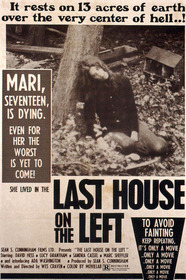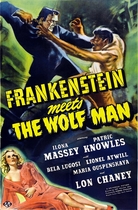Our editor-in-chief Nate Yapp is proud to have contributed to the new book Hidden Horror: A Celebration of 101 Underrated and Overlooked Fright Flicks, edited by Aaron Christensen. Another contributors include Anthony Timpone, B.J. Colangelo, Dave Alexander, Classic-Horror.com's own Robert C. Ring and John W. Bowen. Pick up a copy today from Amazon.com!
Last House on the Left (1972)
There are many words to describe Wes Craven’s first horror effort: repulsive, jarring, unnerving, even sadistic. All words relative to the film’s content, to be sure, but that’s one of the striking things about Last House on the Left: from a critical standpoint, it is neither here nor there, good nor bad; it simply is what it is -- a macabre exploitation film intended to shock. Rather like John Waters’ Pink Flamingos, it is impossible to describe to those who have not seen it, and impossible to defend to those who have. All opinions on its cinematic stature seem valid. But it is, at the very least, a film that commands the attention of the viewer.
Two teenage friends, Mari and Phyllis, leave their comfortable suburban surroundings and head to the city to see a rock concert for Mari’s birthday while Mari’s dopey parents flit about at home hanging streamers. On the way to the concert, Phyllis stops to buy some drugs and, before you know it, lands Mari and herself at the mercy of escaped murderers who hold the girls hostage. That’s pretty much the entire plot. The third act explodes in irony as the monstrous villains meet with bloody recourse, but I’ll leave the specific events of their comeuppance for you to discover, dear reader.
As the film’s brutal second act unfolds, the girls are raped, butchered, and shown no mercy by their captors. The sequences surrounding the murders are probably the film’s most infamous. I’ve seen the film three times--twice uncut on the big screen and once censored on video -- and I dare say it makes little difference which version you see: Craven’s cinematic eye never blinks, no matter how much the horror escalates for Phyllis and Mari.
Shot with documentary-like coldness and featuring long scenes of vicious behavior and murder, the film’s graphic second act is either Craven’s most natural and accomplished work, or his most shameful. I can honestly say I don’t know which. A film director, to me, should have a point. And once his or her point has been made, it’s time to move on. In Last House, Craven and his cinematographer, Victor Hurwitz, never move on; they keep plugging away with shot after shot of brutal rape, evisceration, and humiliation.
There is a part of my mind, though, that both realizes and respects that the very essence of the horror film -- and the reaction it seeks from its viewers -- requires not only the sure-footedness to go beyond what is expected or acceptable, but to not apologize for doing so. So, if taste be damned, then Last House’s second act is cinematic heaven.
The performances of the film vary wildly. Sandra Cassel is capable and very endearing as young Mari, the victim of most focus in the film. Her continual and realistic attempts at escape are nothing if not heartbreaking. When Mari finally concedes defeat in a state of pure shock, there isn’t a single shot in the film that can match the blank release on Cassel’s face. It’s truly stunning. Lucy Grantham’s Phyllis is more hard-boiled than Mari, but also more two- dimensional. Grantham’s treatment of the character does nothing to elevate the material. David Hess, as homicidal ringleader Krug, is just as greasy and vile as can be.
Most of the other characters are one-dimensional, including Mari’s parents, who slip in and out of intelligence as often as most people blink, and the bumbling police investigating Mari and Phyllis’ disappearance. One supporting character, Junior -- the only remorseful member of the murderous trio -- is skillfully portrayed by Marc Sheffler with all the tics and nervous babbling required of a depressingly battered heroin junkie.
The acting isn’t the only element of the film that jerks from good to bad, majestic to awful. For instance, there isn’t a consistent pace to be found in Last House on the Left: sequences of grimy violence are cross-cut with hillbilly humor, and the first two thirds of the film take their time in setting up its horrific premise, whereas the last act clanks and clatters to a finale at breakneck speed. Another problem: certain gory shots deliver on their intent to shock and sicken, yet others are inadvertently humorous. There are too many elements at work for the film to feel even remotely cohesive.
Last House on the Left is not the masterpiece many claim it to be. In fact, it isn’t really so much a coherent film as it is an unpleasant emotional jackhammer. It will not scare you, but it may cause both your blood pressure and your lunch to rise at alarming rates. Sometimes brilliant, sometimes tasteless, and sometimes just plain moronic, there are cinematic items in Craven’s film to both love and despise. It’s a shame, though, when viewers pick one reaction to encapsulate their feelings about the entire film. With all that said, I will note that I recommend Last House on the Left as required horror viewing. It may leave you entertained, it may leave you livid. Morbid exercise or deliberate social commentary? You decide. Just keep reminding yourself: it’s only a movie, it’s only a movie...









Excellent review of the film.
Excellent review of the film. You managed to put down every reaction the movie might cause. Personally I thought it was a sadistic piece of garbage (the first time I saw it) but seeing it multiple times since I realize it's just a film to shock people. In that respoect it certainly works. Craven has gone on and on about this being a reaction to the Vietnam War and a remake of Bergman's "Virgin Spring" but I think he's full of it. He just made a nasty little exploitation film to make money and shock. He succeeded!
I have very little love for
I have very little love for this film myself, Wayne. There are some who champion it; what it does, it does very well, but that doesn't mean I have to *like* it.
"He went for a little walk! You should have seen his face!"